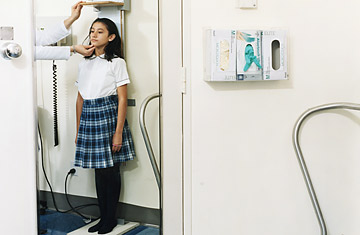
Growth spurts are good — unless they happen too fast and too soon. Then they could suggest premature puberty
(4 of 7)
A much bigger factor is simple genetics. If Mom was an early bloomer, her daughters have a significant chance of following the same developmental arc. "We definitely see this running in families," says Klein. "One study put the prevalence of inheritance of precocious puberty at 27.5%. Daughters will come in for treatment, and mothers will report that they too had their first period at 9 or 10." In these cases too, there is at least a certain rationality and predictability. Much more vexing are the other cases--which happen to be the overwhelming majority--in which the cause is what's known as idiopathic. That, distressingly, is doctor speak for "Beats me."
It's in these situations that the first place most investigators look is weight--and with good reason. Fat is not a passive player in the body's metabolism. Adipose tissue produces a hormone known as leptin, which, in addition to helping regulate metabolism, appetite and energy expenditure, can stimulate the release of GnRH by the hypothalamus. This, at some levels, may be how evolution intended things, at least in girls. Successful childbearing requires an adequate amount of body fat--which is one reason anorexic and significantly underweight girls either do not begin menstruating or stop if they've already started. When girls within even hailing distance of puberty carry a lot of fat, the body may take that as a cue to get the reproductive system booted up.
"This is what we'd call a permissive factor," says Michael Freemark, chief of pediatric endocrinology at Duke University Medical Center. "You need some adipose tissue for puberty to start." Says Kaplowitz: "In girls, it's advantageous to link reproduction to fat stores. In boys, there's no reproductive need for that."
Insulin--which is also at high levels in overweight and obese kids--presents another problem. While the purpose of the hormone is to break down sugars, it also stimulates the production of estrogen in the ovaries of girls and androgens in the adrenal glands of both sexes. In addition, it reduces the amount of a protein that is intended to bind with excess sex hormones and essentially take them out of circulation. That's a bad combination--a little like putting more troublemakers on the streets at the same time you call off the cops. "The hormones," says Freemark, "become freed up and unhooked."
Whether the problem is exacerbated by the agricultural hormones Americans are consuming in their diets is not clear. It's true that overweight kids tend to eat more meat and dairy products than average-weight kids, and meat and dairy are where the hormones would live. But no definite link to precocious puberty has been established. The answer could just be that those foods are higher in calories, it could be that they're indeed higher in hormones--or it could be both. For now, says Klein, "the better evidence points to the calories, but much more research on environmental factors is being done."
If boys and girls are equally likely to carry excess weight--and they are--you'd think they'd be at equal risk for obesity-related precocious puberty too. But they are not. Indeed, a number of studies have found that overweight boys may, if anything, suffer from delayed puberty.
